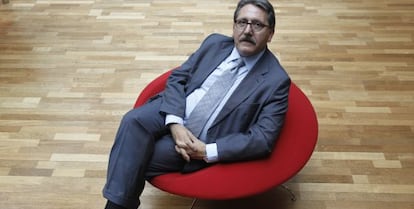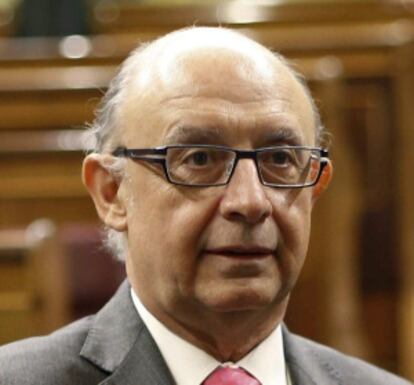Prosecutors probe contract given to firm founded by finance minister
A €90,000 deal signed with Equipo Económico may have violated State Contracts Law Politician Cristóbal Montoro left the company when he returned to politics

Anti-corruption prosecutors are investigating a €90,000 contract that was awarded by the Spanish Chamber of Commerce in 2012 to a legal consultancy firm founded by the current finance minister, Cristóbal Montoro.
Investigators are trying to determine how Montoro’s Equipo Económico firm was selected and if violations to State Contracts Law were committed, such as the contract being awarded without going through a proper bidding process.
Equipo Económico was founded by Montoro in 2006, and is well known in Madrid for its lobbying work
Equipo Económico, which was founded by Montoro in 2006, is well known in Madrid for its lobbying work. It is headed by Ricardo Martínez Rico, a former secretary of state for finance who served with the minister in Prime Minister José María Aznar’s administration.
Montoro created the firm under the name of Montoro y Asociados, but left it when he returned to politics.

According to the contract, which was awarded by the then-Superior Council of Chambers, Equipo Económico was to prepare a guide that would later serve as a draft bill for a new law regulating chambers of commerce. The law, which was approved last year, replaced the Superior Council with the Spanish Chamber of Commerce.
Some weeks back, Martínez Rico, accompanied by his lawyer, was called in to give a statement before anti-corruption prosecutors. Also testifying were Carmen de Miguel, acting secretary for the chamber, and Manuel Teruel, the former chamber president who is now its legal advisor.
Prosecutors had subpoenaed the minutes of the chamber’s executive committee meetings when the contract was discussed. Since the beginning of the inquiry, prosecutors had questioned whether discussions about the contract had taken place before the committee.
“We held various meetings, we met with the president of the committee and other officials. There are a lot of emails and documents that support that the work was carried out,” Martínez Rico said.
Who’s who at Equipo Económico
Ricardo Martínez Rico, current president and CEO of the law firm, served as secretary of state under Cristóbal Montoro, during the Aznar government.
Francisco Piedras, managing partner, was Martínez Rico's chief of staff at the Finance Ministry.
Salvador Ruiz Gallud, managing partner, was director general at the Spanish Tax Agency.
Manuel de Vicente-Tutor, managing partner, was the former head of the technical team at the Tax Agency.
According to a chamber spokesman, the work was delivered “in parts, with a final document” that came later.
“We have demonstrated though various documents that the work was performed,” the spokesman said.
Prosecutors want to know why the contract wasn’t put out to a public bid. Under the law, contracts valued at more than €12,000 must be awarded by tender.
The Spanish Chamber of Commerce is a public body that manages some €110 million in European Union funds to support businesses, especially small companies. The spokesman said that the contract was paid for through private funds and explained that contracts are only put to bid if they are being financed with public money.
The sum payable for the contract was dropped from €216,000 to €90,000. A study was conducted on the impact the new law that the government was proposing would have on the chambers and their work in the future.
According to the spokesman, the executive committee commissioned Teruel in April 2012 to conduct “an urgent and exceptional” search for a consulting firm to carry out an analysis. Months later, the draft bill was presented to the government after it was approved unanimously by the committee.
Anti-corruption prosecutors began their inquiry in January 2014 when it asked the now-defunct Superior Council of Chambers for all of the contracts that it had signed with companies and suppliers during the past five years. These included contracts with big firms such as Price Waterhouse, Deloitte, Indra and Ernst and Young.
Fourteen months later, the investigation is now centered on the contract signed with Equipo Económico.
Tu suscripción se está usando en otro dispositivo
¿Quieres añadir otro usuario a tu suscripción?
Si continúas leyendo en este dispositivo, no se podrá leer en el otro.
FlechaTu suscripción se está usando en otro dispositivo y solo puedes acceder a EL PAÍS desde un dispositivo a la vez.
Si quieres compartir tu cuenta, cambia tu suscripción a la modalidad Premium, así podrás añadir otro usuario. Cada uno accederá con su propia cuenta de email, lo que os permitirá personalizar vuestra experiencia en EL PAÍS.
¿Tienes una suscripción de empresa? Accede aquí para contratar más cuentas.
En el caso de no saber quién está usando tu cuenta, te recomendamos cambiar tu contraseña aquí.
Si decides continuar compartiendo tu cuenta, este mensaje se mostrará en tu dispositivo y en el de la otra persona que está usando tu cuenta de forma indefinida, afectando a tu experiencia de lectura. Puedes consultar aquí los términos y condiciones de la suscripción digital.








































